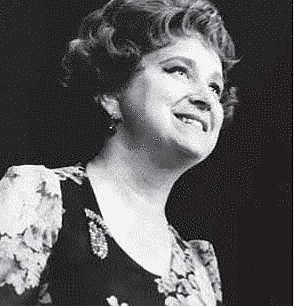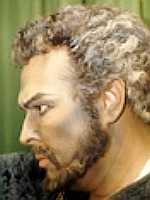Vladimir Atlantov was born at Leningrad on February 19, 1939. His father was the bass Andrej Petrovich (1906–1971) and his mother the
lyrical soprano and voice teacher Maria Aleksandrovna (1897–1978). Both sang at the Malyj Theater, his mother also at the Kirov. She
would reminisce and tell her young son about her performances alongside Shaljapin, Alchevskij, Ershov, Nelepp. When he was a child, he used
to spend his days in the theater, backstage, in the property room, playing with different costumes and stage props. Many years later, he
would say: "My destiny was already set for me at that stage".
As a small child, he survived the horrible siege of Leningrad in World War II.
At the age of 6, he entered the choir of the Glinka State Academic Capella. He studied also the piano and violin there, and finished with a
choir conductor diploma in 1956. He planned to enroll in a musical college, but in 1957 he decided to try his luck before the admission
board of the vocal faculty of the Leningrad State Conservatory. He performed "Caro mio ben" and Glinka's "Skylark", and left a great
impression, being immediately accepted to the preliminary course, and two years later to the faculty itself. Alongside him studied the great singers Evgeniy Nesterenko and Elena Obrazcova. During his studies Atlantov underwent a crisis and had problems with his voice, which he overcame by reading the writings of Caruso and following his method.
In 1957, he was accepted at the preparatory class of the vocal department of the Leningrad state conservatory. After two years, Atlantov
entered the vocal department of the conservatory into the class of Pjotr Gavrilovich Tikhonov, a tenor, and the operatic class of Aleksej
Nikolaevich Kireev, whom he described as a great fatherly figure that influenced him immensely. Among his fellow students were Evgenij
Nesterenko and Elena Obraztsova. At that time, it was discovered that Atlantov had incorrect respiration.
On his request, he was transferred into Natalia Dmitrevna Bolotina's class. According to Atlantov, he overcame his vocal problems by
studying the book on Caruso's method by Salva and Beyer (1935).
In 1962, Atlantov performed three roles at the conservatory: Lenskij, Alfredo and José; and he received the silver medal at the
Second All-Union Glinka Vocalists Competition. That brought him a lot of attention, and while still being a 4th grade student,
he was accepted at the Kirov on probation. In 1963, after graduating from the conservatory, he became a regular soloist of the Kirov.
The same year, he was selected among many other talented young singers and sent to improve his skills in Milan, to the school for
young singers of La Scala, where he had spent two years. He studied with maestro Gennaro Barra. During the first season, Atlantov prepared
Duca and Rodolfo; during the second season, Riccardo and Cavaradossi.
On his return from Italy in 1965, Atlantov started working on the difficult role of Alvaro in "La forza del destino", which he was soon
to perform in Moscow's biggest venue – the Kremlin Conference Hall. At that concert performance, the legendary American impresario
Sol Hurok was present, and was so impressed with the young singer that he invited him to sing at the Met, but he could not get an official
permission.
In 1966 he won the gold medal at the III International Chaikovskij Competition. After hearing him sing in that competition, the
Russian composer G. V. Sviridov said: "I've never heard a dramatic tenor of such beauty, expressiveness and power. He has a great future
ahead of him." The jury of the competition was comprised of such figures as the conductor A. V. Sveshnikov, the legendary Russian tenor
Sergej Lemeshev, the great basso Mark Rejzen, and two Soviet opera divas – Marija Maksakova and Irina Arkhipova. George London was
also present at the competition, and said: "I was very well acquainted with Mario Lanza, and Atlantov reminded me of Lanza in his early
days. He has a first-class operatic voice of great power with a noble and rich timbre. Such voices are a rare gift of nature."
In 1967, Atlantov won the first prize at the prestigious international competition in Sofia (III international competition),
and the fourth place at a competition in Montreal. The same year, during the famous first exchange tour
between La Scala and the Bolshoj, he sang in Milan.
Following that, Atlantov was engaged to the Bolshoj, where he had already appeared as guest in 1964 (Traviata on
October 4th, and Evgenij Onegin on October 7th), and in 1966 (Carmen). His first role as a regular member of the ensemble was German in
January 1968 – his favorite role, by the way.
At the Bolshoj, Atlantov sang 18 roles, 13 of them new: Alfredo, Lenskij (1964), José (1966), German (1968), Vladimir Igorevich
(1968), Pinkerton (1968), Don Carlo (1970), Cavaradossi (1971), Paolo (1973), Semjon Kotko, Vodemon (1974), Grigorij (1974), Sadko
(1976), Don Juan (1976), Otello (1978), Mozart (1978), Canio (1985), and Andrej (Mazepa, 1986).
Sergej Lemeshev highly appreciated Atlantov, and treated him like a son. After seeing him perform Cavaradossi,
he said that the best Italian tenors could learn from him. After his performance as Vodemon in Iolanta in 1974, Lemeshev wrote: "Vodemon in
the rendition of Atlantov conquers the listener with his romanticism and chivalry. His voice is wide and powerful, highly emotional. His
voice can be both tender and gentle, frightening and furious. The performances of Atlantov are always exciting and thrilling, because he is
never indifferent. The difficult role of Vodemon was performed by him with great enthusiasm and mastery, true emotion. In his rendition,
the different moods of the character seem strikingly genuine. I would like to see him perform Otello – that role would fully reveal
his tremendous abilities." And Atlantov indeed became a famous Otello, but only after Lemeshev's death.
In 1988, Atlantov left Moscow and the Bolshoj, continuing his operatic career abroad. His first new role abroad was Andrej Khovanskij
at the Vienna State Opera in 1989. The same year, Atlantov appeared for the first
time as Samson at the Deutsche Oper Berlin. In 1995,
he sang Finn in San Francisco.
Abroad, he also sang Luigi and Riccardo for the first time.
However, his most frequently performed roles abroad remained German, Canio and Otello.
Atlantov appeared at La Scala (1990), the Met (1993, 1994),
Covent Garden (1989, 1993), Vienna Staatsoper (1988–1993), Opéra Bastille (1991, 1992), Colón (1995),
in Hamburg (1988, 1989, 1992, 1993, 1995), Stuttgart (1988–1993), Barcelona (1988, 1992), West Berlin (1988,
1989, 1991, 1993), Rome/Terme di Caracalla (1990, 1994), Munich (1991, 1993, 1994), Las Palmas (1988, 1989), Pittsburgh (1990),
San Francisco (1990, 1996), Costa Mesa (1992, 1995, 1996), with the philharmonic societies of Boston (1991) and Japan (Nagasaki, Osaka,
Tokyo; 1991, 1994), at the festivals in Bregenz (1991) and Verona (1994). His last appearance was as Canio on
March 1st, 1996 in Dortmund (Germany).
His partners included: Tamara Milashkina,
Galina Vishnevskaja, Irina Arkhipova, Elena Obraztsova, Juri Mazurok, Ivan Petrov, Evgenij Nesterenko, Maria Bieşu,
Makvala Kasrashvili, Alexandr Vedernikov, Artur Eizen, Irina Bogacheva, Ludmila Filatova, Galina Kovaleva, Maria Gulegina,
Paata Burchuladze, Anatolij Kocherga, Vladimir Chernov, Dmitri Hvorostovsky, Sergei Leiferkus, Elena Zaremba, Anna Netrebko,
Galina Gorchakova, Mirella Freni, Nicolai Ghiaurov, Piero Cappuccilli, Renato Bruson,
Katia Ricciarelli, Agnes Baltsa, Margaret Price, Samuel Ramey, José van Dam, Renée Fleming, Ileana Cotrubas,
Martti Talvela, Simon Estes, Giuseppe Taddei, Julia Varádi, Kiri Te Kanawa, Bernd Weikl, ...
After 1988, he lived permanently
in Austria. There he was made Kammersänger of the Vienna State Opera.
Repertory at the Vienna State Opera:
Grigorij from February 21, 1976 to October 9, 1988, 39 times
José from November 12, 1972 to May 2, 1982, 11 times
Andrej Khovanskij from January 21 1989 to January 16, 1993, 21 times
Posa on April 8, 1978
Lenskij from April 8, 1989 to April 20, 1890, 4 times
Pinkerton on February 19, 1973
Otello from September 13, 1980 to February 2, 1993, 25 times
Canio from September 3, 1986 to January 1, 1895, 18 times
German from May 16, 1982 to May 29, 1992, 5 times
Samson from March 8, 1991 to December 7, 1991, 4 times
Luigi from February 11, 1979 to January 20, 1981, 15 times
Cavaradossi from November 3, 1972 to November 16, 1976, 7 times
He married the soprano Tamara A.  Milashkina (born 1934). They have a daughter Lada Vladimirovna Atlantova (born 1963).
Milashkina (born 1934). They have a daughter Lada Vladimirovna Atlantova (born 1963).
Reference 1
Reference 2
Reference 3



 Milashkina (born 1934). They have a daughter Lada Vladimirovna Atlantova (born 1963).
Milashkina (born 1934). They have a daughter Lada Vladimirovna Atlantova (born 1963).